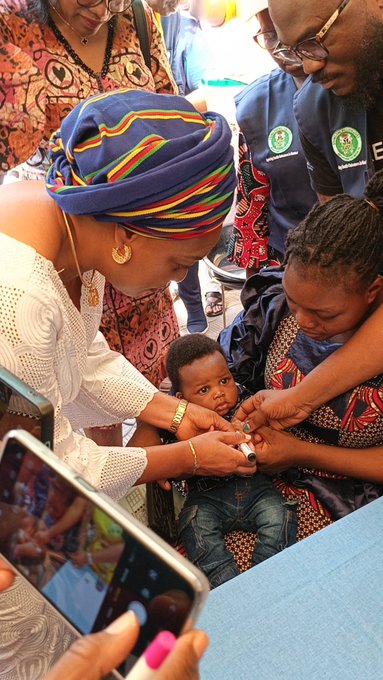Health
Cardiovascular Diseases: CSOs, Journalists Launch Action Against Trans-Fat

A two-day training has ended in Enugu, with journalists and members of the Civil Society Organizations, CSOs, launching a detailed action against Trans-Fat.
At the training, it was harped that Trans-Fat remains a major cause of cardiovascular diseases.
It was then agreed to sustain current advocacy against industrial Trans-Fat Acids (TFAs) oils to check the spate of cardiovascular diseases.
In his opening speech at the training, the Enugu State Commissioner for Health, Prof. Ikechukwu Obi, commended the organizers, Corporate Accountability and Public Participation Africa (CAPPA), for putting in place the Journalism Training on Trans-Fat Reporting.
Obi noted that journalists were critical stakeholders in health education and awareness, adding that they must ensure they get correct, factual and understandable health information that would benefit the public.
According to him, journalists should not allow medical professional becloud them with lots of technical health terminologies, but always learn to ask them to break the words in simple ordinary language meant for understanding of the layman.
“Journalists should try as much as possible to simplify medical terms for clear understanding of the layman. Accurate information passed in an easily understandable language will ensure that misconceptions and misinterpretation are checked in health reporting,” he said.
On the need to stop use of TFAs oils, the commissioner said that the citizens of the country have to be mindful of what they eat and check fatty and oil intakes to stem the tide of cardiovascular diseases in the country.
Obi, however, lauded NAFDAC for coming out with a draft regulation to check the use and consumption industrial TFAs in the country.
The commissioner assured journalists and other stakeholders in the fight against TFAs of collaboration to ensure that “we conquer, as we have done in Ebola, polio and other diseases”.
He said that the state was committed to working with NAFDAC, CAPPA and others in safe-guarding the health of all Nigerians.
READ ALSO: Troops On Search For Missing Commander, Neutralize Two Bandits, Recover Arms, Ammunition
Earlier, the Executive Director of CAPPA, Mr Olufemi Akinbode, said that the workshop was meant to x-ray the dangers of TFAs as well as equipping journalists with necessary knowledge and stakeholders’ contacts that would help enrich their reportage.
According to Akinbode, “we want journalists to use their media advocacy and awareness to influence policy makers and government regulators on making laws and health regulations to check the industrial TFAs.
“Journalists are expected to use their reportage to create awareness of the dangers of TFAs on the people and we achieve appreciable reduction in use of TFAs oil in our meals so that our people will remain healthy,” he said.
Dr Jerome Mafeni, Technical Director on TFAs with Network for Health Equity and Development, lauded CAPPA and its partners on the sustenance of the advocacy against TFAs, as well as for mobilizing the media to join actively in the fight.
Mrs Joy Amafah, Nigeria in-Country Coordinator of Global Health Advocacy Incubator (GHAI), noted that there was no way you can run a successful campaign meant to influence the attitude of the public without using the media.
“I look forward for a successful engagement and outcome on TFAs education and advocacy,” Amafah said.
DAILY POST reports that the two-day workshop was attended by journalists from across the South-East States.
Health
LASG FLags Off Polio Outbreak Response Campaign

The Lagos State Government, through the Lagos State Primary Health Care Board, has launched the 2025 Polio Outbreak Response Campaign, reaffirming its commitment to eradicating polio and safeguarding the health of its children.
The ceremony, held at the Simpson Primary Healthcare Centre, was led by the First Lady of Lagos State, Dr. (Mrs.) Claudiana Ibijoke Sanwo-Olu, represented by Mrs. Widad Jumoke Mustafa, a member of the Committee of Wives of Lagos State Officials (COWLSO).
In her address, the First Lady emphasised the state government’s proactive measures to keep Lagos polio-free, highlighting the critical importance of the campaign in preventing the debilitating effects of poliomyelitis, which can result in paralysis or death.
READ ALSO: IMPEACHMENT: Lagos Ex-Speaker, Obasa’s ‘Sins’ Revealed
The First Lady also called on parents, community leaders, and stakeholders to support the campaign by ensuring eligible children are vaccinated.
Targeting children aged 0-59 months, vaccination teams will administer the Oral Polio Vaccine (OPV) to prevent virus transmission.
Dr. Kemi Ogunyemi, the Special Adviser on Health, expressed gratitude to Lagosians for their continued cooperation in the fight against polio. While appreciating all healthcare workers and partners for their services, Mrs. Ogunyemi encouraged parents to present their children and wards for the exercise.
Also speaking, the Chairman of Lagos Mainland Local Government, Mrs. Omolola Rashidat Essien opined that Immunization is key in ensuring that children are kept safe from polio and other vaccine preventable diseases.
Dr. Abimbola Bowale, the Supervising Permanent Secretary, Lagos State Primary Health Care Board, who also spoke at the event, underscored the life-saving importance of immunization.
“All children aged 0-59 months need multiple doses of the polio vaccine to ensure full protection. Any child missed represents a potential risk for the poliovirus to spread. The vaccine is safe, effective, and crucial in keeping our communities polio-free,” he stated.
Dr. Bowale also outlined several strategies to ensure the success of the campaign, including fixed post teams stationed at primary healthcare centres and public health facilities, house-to-house visits, and a transit strategy to reach special locations such as places of worship, schools, motor parks, and other public venues.
The event concluded with Dr. (Mrs.) Claudiana Ibijoke Sanwo-Olu officially launched the campaign, marking a renewed effort to maintain Lagos State’s polio-free status.
Headline
Lagos Cholera Cases Rise To 421

The Lagos state suspected cholera cases have risen to 421.
The Commissioner for Health, Akin Abayomi disclosed this on his Instagram handle @profakinabayomi on Saturday.
“As of June 20, 2024, an additional four suspected cholera cases have been reported, as illustrated in the accompanying graph,” he wrote.
He noted that the Emergency Operations Centre in collaboration with all relevant partners is actively engaged in contact tracing, community-based surveillance, awareness campaigns, sample testing, and ensuring that confirmed cholera cases receive appropriate medical treatment.
READ ALSO: Two Suspects Arrested For Stealing Car From Mosque During Juma’at Prayer
On Friday, the commissioner confirmed 35 cases out of the 417 suspected cases and 24 deaths across 20 Local Government Areas in the state.
The cases were reported from Agege, Badagry, Ikeja, Mushin, Ajeromi-Ifelofun, Epe, Ikorodu, Ojo, Alimosho, and Eti-Osa.
Others were Kosofe, Oshodi-Isolo, Amuwo-Odofin, Ibeju-Lekki, Lagos Island, Shomolu, Apapa, Ifako-Ijaiye, Lagos mainland, and Surulere.
Cholera is a food and water-borne disease caused by ingesting the bacteria— Vibrio cholerae — in contaminated water and food. Cholera can cause severe acute watery diarrhoea, and the severe forms of the disease can kill within hours if left untreated.
In Nigeria, cholera is an endemic and seasonal disease, occurring annually mostly during the rainy season and more frequently in areas with poor sanitation.
READ ALSO: Police Arrest 28yr Old Suspected Cultists, Recover Gun In Delta Community
The World Health Organisation on Thursday announced a spike in cholera in several regions of the world, with almost 195,000 cases and over 1,900 deaths reported in 24 countries since the start of 2024.
WHO said the Eastern Mediterranean Region reported the highest number of cases, followed by the African Region, the Region of the Americas, the Southeast Asia Region, and the European Region.
The global health body, however, noted that there are no reported cases in the Western Region, according to its bulletin released on Wednesday.
It said it exhausted its global stockpile of Oral Cholera Vaccines by March but was able to exceed “the emergency target of five million doses in early June for the first time in 2024.”
Health
AUTISM: What You Need To Know

By Silver Yeibake
Autism, commonly known as Autism Spectrum Disorder (ASD), is a neurodevelopmental disorder that affects communication, social interaction, and behavior. Autism is referred to as a spectrum condition since it can manifest in a variety of symptoms and abilities. While the actual cause of autism is unknown, evidence suggests that genetic and environmental factors interact to influence its development.
The risk factors include a sibling with autism, advanced age of parents, exposure to certain air pollutants and pesticides before birth, extreme prematurity, mothers with diabetes, immune system disorders or obesity, any difficulty with delivery leading to deprivation of oxygen to the baby’s brain, fever during pregnancy, lack of certain vitamins minerals during pregnancy, and certain genetic conditions, such as Down, fragile X, and Rett syndromes.
“Risk factors can not on their own cause a disease. However, they can increase the likelihood of that disease in a person.”
It is important to know that contrary to trending claims online, there is no scientific or medical evidence that vaccines or consumption of sugar are risk factors for autism.
READ ALSO: Kidney Stones: What You Need To Know
Autism is defined by difficulties in social interaction and communication. Individuals with autism may struggle to grasp social cues, maintain eye contact, and engage in typical back-and-forth conversations. Some people may also engage in meaningless, repetitive actions, such as hand-flapping or rocking, and have strong interests in specific areas.
It is essential to remember that autism is a lifelong diagnosis, but with early intervention and adequate care, people with autism can live fulfilling lives.
Autism treatment frequently includes behavioral therapy, speech therapy, occupational therapy, and social skills training. Each individual with autism is unique, thus interventions should be tailored to meet their personal needs and strengths.
In spite of the difficulties that autism can cause, many people with autism possess unique talents and abilities. Some people may succeed in fields such as music, art, mathematics, or programming, thus it is important for society to acknowledge and honor the qualities and achievements of people with autism.
In summary, autism is a complicated and diverse disorder that affects individuals in various ways. By raising autism knowledge, understanding, and acceptance, we can build a more inclusive society in which people with autism can thrive and attain their full potential.
Dr. Yeibake, Weriwoyingipre Silver.
Senior Registrar,
Faculty Of Pediatrics,
WACP

 News5 days ago
News5 days agoUBTH CMD Marks 120 Days In Office, Expresses Commitment To Providing Conducive Working Environment

 News5 days ago
News5 days agoFIRS Confirms NIN As Tax ID

 Metro4 days ago
Metro4 days agoFintiri Pardons Man Sentenced To Death For ‘Killing Herdsman In Self-defence’, Others

 News4 days ago
News4 days agoJUST IN: Kano Lawmaker, Sarki Aliyu Daneji, Dies Hours After Colleague’s Passing

 News5 days ago
News5 days agoOPINION: My Man Of The Season

 News4 days ago
News4 days agoFULL LIST: Churches That Don’t Celebrate Christmas

 News5 days ago
News5 days agoKWAM 1 Withdraws From Awujale Race, Ends Court Challenge

 Metro4 days ago
Metro4 days agoPetrol Tanker Crashes Into Akpabio’s Convoy, Kills Police Dispatch Rider

 Headline2 days ago
Headline2 days agoJUST IN: US Forces Bomb Terrorists Camps In Nigeria

 News2 days ago
News2 days agoOkpebholo Slams ₦25bn Libel Suit On Edo PDP Chairman
































